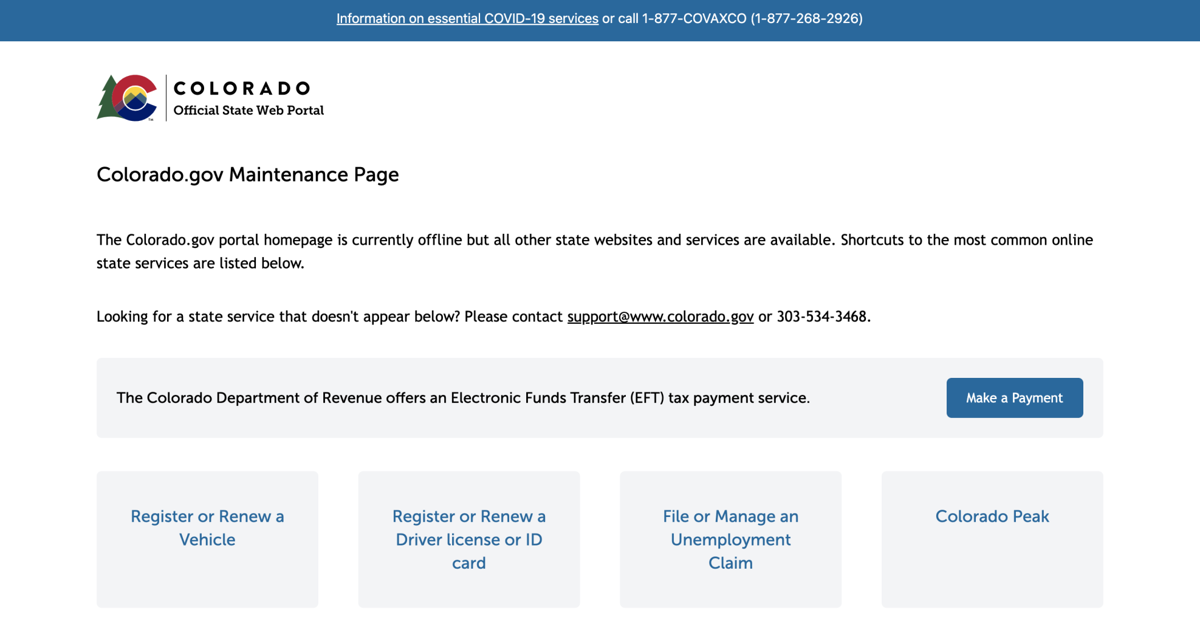The state-run Colorado.gov portal homepage went back online Thursday evening after the state said a cyberattack shut it down.
The homepage resumed operations around 6 p.m. Thursday, just over 24 hours after the State Emergency Operations Center said an “anonymous suspected foreign actor” forced it offline. State officials said the attacker also targeted multiple other state government services and websites across the U.S.
Colorado officials have not released any additional information about who was responsible for the cyberattack, which states were affected or what data was potentially exposed.
“This cybersecurity incident is part of an ongoing investigation in collaboration with state and federal partners,” the State Emergency Operations Center said in a statement. “No further details are available at this time due to the sensitivity and nature of the cyber event.”
CNN reported that the pro-Russia hacking group Killnet took credit for the cyberattack, also claiming to have knocked state government websites offline in Kentucky, Mississippi and other states.
NBC said the hacking group simply overwhelmed the states’ websites with web traffic to take them down, and there is no indication that any of the states’ internal systems were accessed.
Only Colorado’s portal homepage was affected by the cyberattack, all other Colorado.gov websites and state government services were unaffected. The State Emergency Operations Center, Governor’s Office of Information Technology and Statewide Internet Portal Authority are actively monitoring state websites and systems.
This latest assault occurred after a cyberattack in August hit most county departments in Fremont County, limiting county services for several weeks. Most but not all government services were back up and running as of Monday, Fremont County Commissioner Dwayne Mcfall said.
The Governor’s Office of Information Technology determined the Fremont County cyberattack was executed by BlackCat ransomware, also known as ALPHV. Actors affiliated with BlackCat often request multi-million-dollar ransom payments of cryptocurrency, such as Bitcoin or Monero, to recover encrypted digital files, according to the Federal Bureau of Investigation.
Cities and states across America have come under cyberattacks – with increasing severity and regularity – in the last few years.
Comparitech, a company that reviews cybersecurity tools, said America faced nearly 2,000 ransomware attacks since 2018, with the average ransom demand at nearly $2 million. These attacks, the company said, have so far cost healthcare organizations $20.8 billion, schools and colleges $3.56 billion, governments $18.9 billion, and businesses $20.9 billion.
The National Conference of State Legislatures said at least 40 states, plus Puerto Rico, introduced or considered about 250 bills or resolutions that deal with cybersecurity just this year.
Read More: www.coloradopolitics.com











 Bitcoin
Bitcoin  Ethereum
Ethereum  Tether
Tether  Solana
Solana  XRP
XRP  Dogecoin
Dogecoin  USDC
USDC  Cardano
Cardano  Lido Staked Ether
Lido Staked Ether  Avalanche
Avalanche  TRON
TRON  Toncoin
Toncoin  Stellar
Stellar  Wrapped stETH
Wrapped stETH  Shiba Inu
Shiba Inu  Wrapped Bitcoin
Wrapped Bitcoin  Polkadot
Polkadot  Chainlink
Chainlink  WETH
WETH  Bitcoin Cash
Bitcoin Cash  Sui
Sui  Pepe
Pepe  NEAR Protocol
NEAR Protocol  LEO Token
LEO Token  Uniswap
Uniswap  Litecoin
Litecoin  Aptos
Aptos  Wrapped eETH
Wrapped eETH  Hedera
Hedera  Internet Computer
Internet Computer  USDS
USDS  Cronos
Cronos  Ethereum Classic
Ethereum Classic  POL (ex-MATIC)
POL (ex-MATIC)  Bittensor
Bittensor  Render
Render  Ethena USDe
Ethena USDe  Artificial Superintelligence Alliance
Artificial Superintelligence Alliance  Arbitrum
Arbitrum  Filecoin
Filecoin  Celestia
Celestia  Bonk
Bonk  Dai
Dai  Stacks
Stacks  WhiteBIT Coin
WhiteBIT Coin  Cosmos Hub
Cosmos Hub  Immutable
Immutable